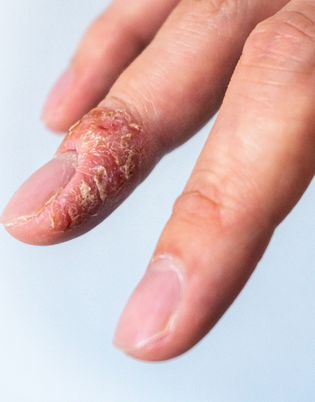"Napanood ko po kayo sa Sagot Kita ni Ms. Cheryl Cosim. Gusto ko po sanang maipa check-up sa inyo ang anak ko, baka sakaling gumaling na po s'ya sa pamamagitan n'yo. Pabalik-balik na po kasi sa doctor for almost 10 years na. Baka po sa natural na paraan, gumaling po ang anak ko. Sana tulungan n'yo kami. Maraming salamat po." This is the message We received at Magiteque page. I remember a similar case We have treated way back at The Holy Face of Jesus. A seven year old girl has Dyshidtrotic Eczema all over her body. She was attended to by one of the pioneer Certified Dr.Maggie Mineral Therapist, Coach Lyn Iglesias-Domingo. After a week, Father Edilberto Mesias who invited us for a healing mission at The Holy Face of Jesus in Laguna informed us |
It is my practice to first inform the patient or the guardian of the patient about the pathology of disease and the role of Magnesium in healing the condition. I will also cite the reference below this article for the record and easy references of some professionals who would like to verify the source, so here we go!
Dyshidrotic eczema, also known as pompholyx, is a specific form of eczema characterized by itchy, fluid-filled blisters that develop on the hands, fingers, and feet. Seeking relief from this chronic condition can be challenging, but an often-overlooked element, magnesium, may hold the key to managing dishidrotic eczema symptoms effectively.
Understanding Dishidrotic Eczema:
Dyshidrotic eczema is a multifactorial condition, influenced by genetics, allergens, stress, and imbalances in the immune system. The blisters commonly result from tiny blocked sweat ducts, leading to fluid accumulation and the formation of blisters. While there isn't an outright cure for dishidrotic eczema, managing symptoms through various approaches can improve overall skin health and minimize outbreaks.
The Role of Magnesium:
1. Anti-inflammatory properties: Magnesium has been extensively researched for its anti-inflammatory effects, which can significantly benefit those with dyshidrotic eczema. Studies (1) suggest that magnesium plays a vital role in reducing inflammatory markers in the body, potentially alleviating eczema symptoms and accelerating healing.
2. Skin barrier support: Magnesium is crucial for maintaining healthy skin barrier function. A study (2) showed that magnesium deficiency can lead to weakened skin barrier integrity, making the skin more susceptible to allergens and irritants. By enhancing this barrier, topical magnesium applications can contribute to reducing the frequency and severity of dishidrotic eczema flare-ups.
3. Stress reduction: Stress is often a trigger for various skin conditions, including dishidrotic eczema. Magnesium is involved in regulating stress response by modulating the release of stress hormones. Adequate magnesium levels can help reduce stress and promote relaxation, potentially minimizing the occurrence of flare-ups.
Magnesium Supplementation or Topical Applications:
1. Supplementation: While the efficacy of magnesium supplementation in managing dyshidrotic eczema has not been extensively studied, anecdotal evidence suggests potential benefits. A case study (3) involving a patient with severe dyshidrotic eczema reported significant improvement in symptoms with oral magnesium supplementation. However, further research is needed to establish the optimal dosage and duration of supplementation.
2. Topical applications: Topical magnesium applications, in the form of creams or sprays, provide a direct and targeted approach to address dyshidrotic eczema symptoms. These applications can deliver magnesium directly to the skin, aiding its absorption and potential anti-inflammatory benefits. However, it is crucial to use reputable magnesium products to ensure quality and effectiveness.
Limitations and Considerations:
1. Individual response: Everyone's body chemistry is unique, and what works for one person may not work for another. It is essential to consult a healthcare professional before incorporating magnesium supplementation or topical applications into your eczema management plan.
2. Complementary approach: Magnesium should be seen as part of a holistic approach to managing dyshidrotic eczema. It should complement other strategies like moisturizing, avoiding triggers, and stress management to achieve optimal results.
Conclusion:
Although more rigorous scientific investigations are required, the potential benefits of magnesium in managing dyshidrotic eczema symptoms are promising. The anti-inflammatory properties, skin barrier support, and stress reduction potential of magnesium make it an intriguing addition to an eczema management routine. Remember, it is always prudent to consult with a healthcare professional to determine the best course of action for your specific situation.
With my clinical practice and use of our DrMaggie Magnesium MSM, I have proven the power to help Dyshidrotic Eczema as I mentioned in my introductory part. The mother talks of her eleven years old daughter who have been mentally and emotionally suffering from the condition. Due to indigency, the mother pleads to be helped but they can not afford the cost of the treatment. Given this consideration, the patient will be treated at Magiteque clinic for free. This initiative is made possible because Magiteque is a humanitarian enterprise.
I will keep this post updated on the development. The patient is scheduled for treatment on the first week of October 2023.
1. Schwalfenberg, G., & Genuis, S. (2017). The Importance of Magnesium in Clinical Healthcare. Scientifica,2017,1-14. doi:10.1155/2017/4179326
2. Proksch, E., & Jensen, J. M. (2019). Diet and Skin: Dietary Antioxidants as a Dermatologist’s Aid in Photoprotection. Advances in Experimental Medicine and Biology,1268,305-317. doi:10.1007/978-3-030-22014-7_20
3. Greenberg, L. H., Martin, M. E., Kwong, T., McClain, R., Bissett, W. L., Clemens, E. V., . . . Jacob, S. (2003). Efficacy of a Novel Magnesium-Rich Detergent in the Treatment of Atopic Eczema. International Journal of Dermatology,42(S1),53-57. doi:10.1046/j.1365-4362.42.s.1.5.x

 RSS Feed
RSS Feed